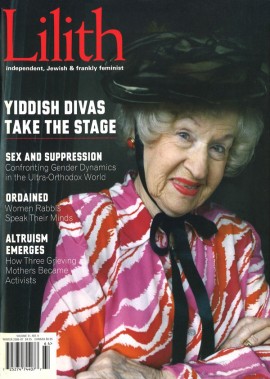Winter 2006-2007
In this issue: Now in their 80s and 90s, stars of Yiddish stage still woo audiences; see how great they look! Leela Corman’s graphic novel Unterzakhn (Underthings). Sex and suppression in ultra-Orthodox communities, where women can’t walk on the men’s sidewalk. Women rabbis speak their minds. How the trauma of a child’s death led three mothers to become activists.
So Many Rules, So Little Protection
by Hella Winston
The author examines communities where women and men must walk on separate sides of the street, where long aprons for maids are required, and where underground struggles over allegations of abuse are causing explosive turmoil.
Jimmy Swaggart Teaches Me Faith September 24, 2004
poetry by Miller Oberman
Taking The Ritual Laugh
by Rebecca Stone
Generations of educated religious women, who love to live at the edge of tradition.
Losing a Child
by Rabbi Susan Schnur
The trauma of a child's death is the unwelcome catalyst for a worldwide effort for safer roads, advocacy for children's cancer drugs and grants for young progressives.
- Believing in young Jews who want to change the world an interview with Ruth Schulman
- Creating a Career in Children's Cancer Advocacy an interview with Susan L. Weiner
- Promising to make third-world roads safer an interview with Rochelle Sobel
Ordained
Sally Priesand, the first woman rabbi in the U.S., just retired. She and her pioneering colleagues surprise us when they dish about those early years. With an introduction by Rabbi Jackie Ellenson.
- When I was Ordained, It was Difficult to Find a Job. by Sally Priesand
- I Fear that the Epitaph on my Tombstone will Read "She was the One who Brought the Dildo to Reines' Class." by Myra Soifer
- When I Arrived, I had No Place to Stay, for No One at the Jerusalem School would Co-sign a Paper Needed for a Pre-rental Agreement. by Helene Ferris
- I Received the Article from My Mother, Who Sent it to me in Jerusalem, Where I was Studying at Hebrew University during my Junior year in College. by Mindy Avra Portnoy
- More than Thirty Years Ago, When People Heard that her Daughter was a Rabbinic Student, They would Say to My Mother, "She's going to be a woman rabbi??" by Ellen Weinberg Dreyfus
- We Were all Very Young, Most of us Fresh Out of College. by Ellen Jay Lewis
- The Presence of Women in the Rabbinate Challenged People to Think about God in a Different Way. by Laura Gelle
Yiddish Divas Take the Stage
by Joan Roth
A photo essay spotlighting stars of the Yiddish stage, who in their 80s and 90s still woo and wow audiences.
Hilda Terry, 1914-2006
Giving Rabbis the Words to Talk About Abuse
Mazal Tov! 9 Jewish Women in U.S. Congress
“Waiting for This Book All My Life”
Eavesdropping in the Halls of Jewish Academe
Tefillin Barbie
One in Eight: Breast Cancer Roulette
I Wore Lipstick to My Mastectomy
Conservatives Say Yes to Gay Rabbis
Mikvah Becomes Mainstream?
Dara Horn on “The Din in the Head”
Tammy Hepps on “Tolstoy Lied”
Rahel Lerner on “Light Years”
Caraid O'Brien on ”A House with Seven Windows”
Rachel Josefoivitz Siegel on ”Sala's Gift: My Mother's Holocaust Story”
Yael Flusberg on ”A Woman in Jerusalem”
Idra Novey on ”Look There,” and "Let the Words"
Gabrielle Birkner on ”Teta, Mother, and Me: Three Generations of Arab Women”
 Please wait...
Please wait...
